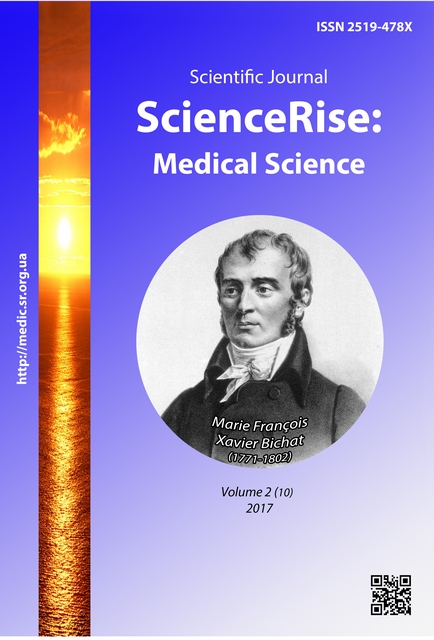The analysis of violation features of hypo-curation type pharmacological compliance in patients with type 2 diabetes mellitus
DOI:
https://doi.org/10.15587/2519-4798.2017.94379Keywords:
type 2 diabetes mellitus, compliance, incompliance, psychological disorders, psychodiagnosticsAbstract
Aim. To determine features and triggers of hypo-curation type pharmacological compliance violations in patients with type 2 diabetes.
Materials and methods. 486 patients with type 2 diabetes mellitus were examined on the clinical basis of therapy, clinical pharmacology and endocrinology department of the State Institution “Zaporizhzhia medical academy of post-graduate education of Ministry of health of Ukraine”.
The patients were divided in two groups depending on type 2 diabetes severity levels: 312 patients with DM type 2 of moderate severity formed the first clinical group; the other 174 patients with severe DM type 2 formed the second clinical group.
Anamnesis and clinical examination, clinical and psychopathological, and statistical methods were used.
Results. In result of research, specific features and triggers of hypo-curation type pharmacological compliance violations in patients with type 2 diabetes were determined.
It was found, that pharmacological compliance violations in patients with type 2 diabetes were observed in 76.34 % of cases, in 66.87 % among them hypo-curation type pharmacological compliance violations were identified. Structural components of hypo-curation type pharmacological compliance were determined. Features of carbohydrate metabolism disorders in patients with hypo-curation type pharmacological compliance violations were observed. Incompliance factors as triggers of hypo-curation type pharmacological compliance violations in patients with type 2 diabetes were selected; they were classified, and their correlation was determined.
Conclusion. The notion about hypo-curation type pharmacological compliance violations in patients with type 2 diabetes was expanded. That eliminated gaps in scientific knowledge about pharmacological compliance violations in patients with type 2 diabetes
References
- Grimes, R. T., Bennett, K., Hoey, H., Tilson, L., Henman, M. C. (2016). A retrospective cohort analysis of hypoglycaemic and cardiovascular agent use in young adults in the Irish primary care setting. Irish Journal of Medical Science, 1–10. doi: 10.1007/s11845-016-1491-x
- Gentili, P., Maldonato, А., Bloise, D., Burla, F., Coronel, G., Di Paolantonio, T. (2000). Personality variables and compliance with insulin therapy in Type 2 diabetic subjects. Diabetes, nutrition & metabolism, 13 (1), 1–6.
- Jaacks, L. M., Siegel, K. R., Gujral, U. P., Narayan, K. M. V. (2016). Type 2 diabetes: A 21st century epidemic. Best Practice & Research Clinical Endocrinology & Metabolism, 30 (3), 331–343. doi: 10.1016/j.beem.2016.05.003
- Meetoo, D., McGovern, P., Safadi, R. (2007). An epidemiological overview of diabetes across the world. British Journal of Nursing, 16 (16), 1002–1007. doi: 10.12968/bjon.2007.16.16.27079
- Roy, T., Lloyd, C. E. (2012). Epidemiology of depression and diabetes: A systematic review. Journal of Affective Disorders, 142, S8–S21. doi: 10.1016/s0165-0327(12)70004-6
- The Protocol of rendering medical care to patients not complicated by diabetes (2009). Ministry of Healthcare of Ukraine, No. 574. Available at: http://www.moz.gov.ua/ua/portal/dn_20090805_574.html
- Unified clinical protocol of primary, emergency, secondary (specialized) and tertiary (highly specialized) medical care. Diabetes in young people and adults (2014). Ministry of Healthcare of Ukraine, No. 1021. Available at: http://mtd.dec.gov.ua/images/dodatki/2014_1021_CD1_dor/2014_1021_nakaz_CD1_dor.pdf
- Bairy, S., Kumar, A. M. V., Raju, M., Achanta, S., Naik, B., Tripathy, J. P., Zachariah, R. (2016). Is adjunctive naturopathy associated with improved glycaemic control and a reduction in need for medications among type 2 Diabetes patients? A prospective cohort study from India. BMC Complementary and Alternative Medicine, 16 (1), 290. doi: 10.1186/s12906-016-1264-0
- Huang, C. H., Lin, P. C., Chang Yeh, M., Lee, P. H. (2017). A Study on Self-Care Behaviors and Related Factors in Diabetes Patients. Hu Li Za Zhi, 64 (1), 61–69.
- Roohafza, H., Kabir, A., Sadeghi, M., Shokouh, P., Ahmadzad-Asl, M., Khadem-Maboudi, A. A., Sarrafzadegan, N. (2016). Stress as a risk factor for noncompliance with treatment regimens in patients with diabetes and hypertension. ARYA Atheroscler, 12 (4), 166–171.
Downloads
Published
How to Cite
Issue
Section
License
Copyright (c) 2017 Olga Tkachenko

This work is licensed under a Creative Commons Attribution 4.0 International License.
Our journal abides by the Creative Commons CC BY copyright rights and permissions for open access journals.
Authors, who are published in this journal, agree to the following conditions:
1. The authors reserve the right to authorship of the work and pass the first publication right of this work to the journal under the terms of a Creative Commons CC BY, which allows others to freely distribute the published research with the obligatory reference to the authors of the original work and the first publication of the work in this journal.
2. The authors have the right to conclude separate supplement agreements that relate to non-exclusive work distribution in the form in which it has been published by the journal (for example, to upload the work to the online storage of the journal or publish it as part of a monograph), provided that the reference to the first publication of the work in this journal is included.









